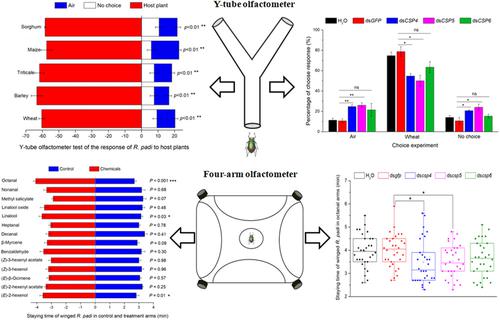当前位置:
X-MOL 学术
›
Insect Sci.
›
论文详情
Our official English website, www.x-mol.net, welcomes your
feedback! (Note: you will need to create a separate account there.)
Involvement of chemosensory proteins in host plant searching in the bird cherry-oat aphid
Insect Science ( IF 2.9 ) Pub Date : 2020-08-12 , DOI: 10.1111/1744-7917.12865 Xiong Peng 1 , Lang Liu 1 , Yi-Xiao Huang 1 , Su-Ji Wang 1 , De-Xian Li 1 , Shu-Ting Chen 1 , Jean-Christophe Simon 2 , Ming-Jing Qu 3 , Mao-Hua Chen 1
Insect Science ( IF 2.9 ) Pub Date : 2020-08-12 , DOI: 10.1111/1744-7917.12865 Xiong Peng 1 , Lang Liu 1 , Yi-Xiao Huang 1 , Su-Ji Wang 1 , De-Xian Li 1 , Shu-Ting Chen 1 , Jean-Christophe Simon 2 , Ming-Jing Qu 3 , Mao-Hua Chen 1
Affiliation

|
Chemosensory systems are considered to play an important role in host plant selection in herbivorous insects. However, few studies have focused on chemosensory proteins (CSPs) for aphid host-location mechanisms. The roles of CSPs in searching for different Poaceae species (wheat, barley, triticale, maize and sorghum) were tested in Rhopalosiphum padi, an important cereal pest. The olfactometer assays showed that R. padi responds to plant odors. Seven R. padi CSP genes were identified. Influence of aphid morph, tissue and starvation state on expression patterns of CSPs was evaluated. Expression levels of CSP1, CSP4, CSP5 and CSP6 in winged aphids were significantly higher than those in wingless ones. Transcription levels of four genes (CSP1, CSP4, CSP5 and CSP6) were relatively higher in the head with antennae, and the four genes tended to be upregulated following starvation. Silencing of three CSPs (CSP4, CSP5 and CSP6) altered aphid host-location behavior in response to the five different host plants tested. Three volatile compounds of host plants (octanal, [E]-2-hexenol and linalool) have significant attraction to winged R. padi according to the four-arm olfactometer tests. Molecular docking predicted hydrogen bonding sites which played key roles in the binding of CSP4, CSP5 and CSP6 with volatile compounds. Knockdown of CSP4 or CSP5 significantly decreased the staying time of R. padi in the arms with octanal. However, knockdown of CSP6 could not affect the response of R. padi to octanal. These results bring evidence for the involvement of three CSPs in R. padi host-location behavior.
中文翻译:

化学感应蛋白在鸟樱桃燕麦蚜虫寄主植物搜寻中的作用
化学感应系统被认为在食草昆虫的宿主植物选择中发挥重要作用。然而,很少有研究关注用于蚜虫宿主定位机制的化学感应蛋白 (CSP)。在Rhopalosiphum padi(一种重要的谷物害虫)中测试了 CSP 在寻找不同禾本科物种(小麦、大麦、黑小麦、玉米和高粱)中的作用。嗅觉计分析表明,R. padi对植物气味有反应。鉴定了七个R. padi CSP基因。评估了蚜虫形态、组织和饥饿状态对CSP表达模式的影响。CSP1、CSP4、CSP5和CSP6的表达水平有翅蚜虫显着高于无翅蚜虫。4个基因( CSP1、CSP4、CSP5和CSP6 )的转录水平在有触角的头部相对较高,并且在饥饿后这4个基因趋于上调。三种CSP(CSP4、CSP5和CSP6)的沉默改变了蚜虫宿主定位行为,以响应测试的五种不同寄主植物。宿主植物的三种挥发性化合物(辛醛、[ E ]-2-己烯醇和芳樟醇)对有翅R. padi具有显着吸引力根据四臂嗅觉计测试。分子对接预测氢键位点在 CSP4、CSP5 和 CSP6 与挥发性化合物的结合中起关键作用。击倒CSP4或CSP5显著下跌的停留时间R.蚜与辛在了怀里。然而,CSP6 的敲低不会影响R. padi对辛醛的反应。这些结果为三个 CSP 参与R. padi宿主定位行为提供了证据。
更新日期:2020-08-12
中文翻译:

化学感应蛋白在鸟樱桃燕麦蚜虫寄主植物搜寻中的作用
化学感应系统被认为在食草昆虫的宿主植物选择中发挥重要作用。然而,很少有研究关注用于蚜虫宿主定位机制的化学感应蛋白 (CSP)。在Rhopalosiphum padi(一种重要的谷物害虫)中测试了 CSP 在寻找不同禾本科物种(小麦、大麦、黑小麦、玉米和高粱)中的作用。嗅觉计分析表明,R. padi对植物气味有反应。鉴定了七个R. padi CSP基因。评估了蚜虫形态、组织和饥饿状态对CSP表达模式的影响。CSP1、CSP4、CSP5和CSP6的表达水平有翅蚜虫显着高于无翅蚜虫。4个基因( CSP1、CSP4、CSP5和CSP6 )的转录水平在有触角的头部相对较高,并且在饥饿后这4个基因趋于上调。三种CSP(CSP4、CSP5和CSP6)的沉默改变了蚜虫宿主定位行为,以响应测试的五种不同寄主植物。宿主植物的三种挥发性化合物(辛醛、[ E ]-2-己烯醇和芳樟醇)对有翅R. padi具有显着吸引力根据四臂嗅觉计测试。分子对接预测氢键位点在 CSP4、CSP5 和 CSP6 与挥发性化合物的结合中起关键作用。击倒CSP4或CSP5显著下跌的停留时间R.蚜与辛在了怀里。然而,CSP6 的敲低不会影响R. padi对辛醛的反应。这些结果为三个 CSP 参与R. padi宿主定位行为提供了证据。











































 京公网安备 11010802027423号
京公网安备 11010802027423号